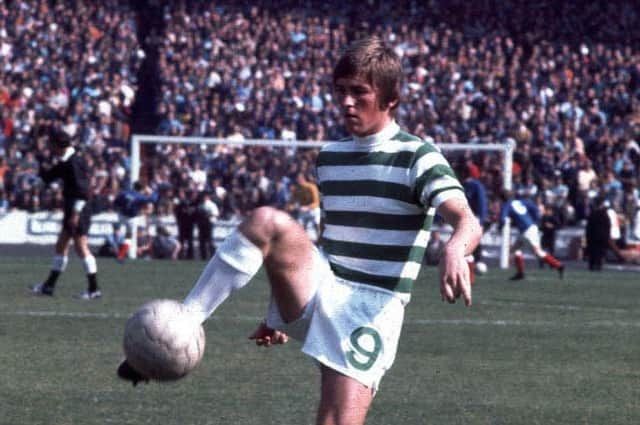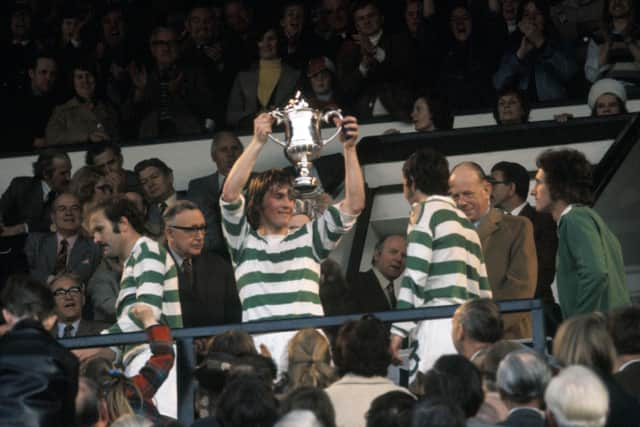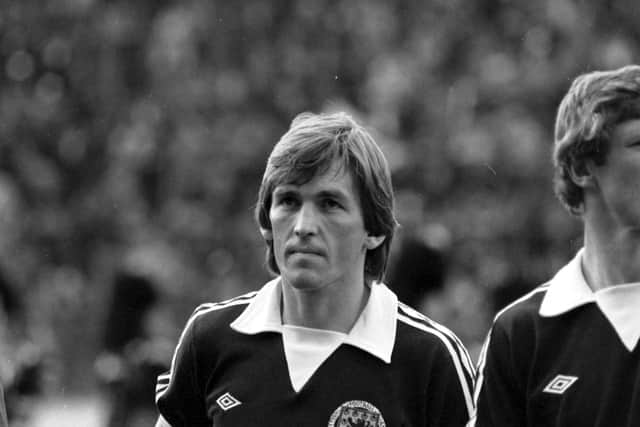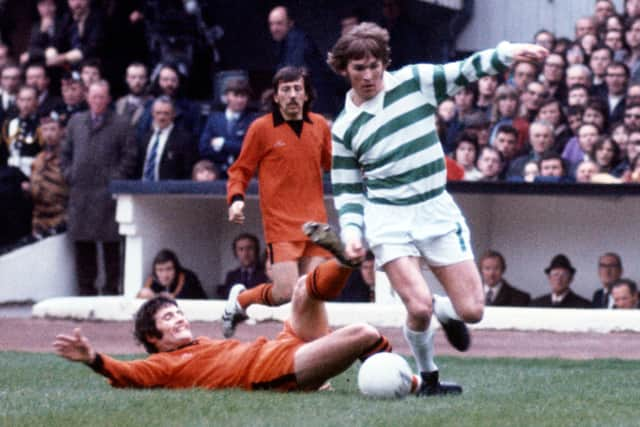Kenny Dalglish at 70: Why Celtic greatness should be more than a footnote to Liverpool glories


Only one of them is devoted entirely to his time spent with Celtic - despite his associations with the Parkhead club then covering 10 of the previous 15 years. It speaks to a pattern embroidered ever since. One that, as the football great’s 70th birthday rolls around, demands to be unpicked.
Celtic was no mere footnote in Dalglish’s dazzling playing career. His August 1977 move to Liverpool, for a then record British transfer fee of £440,000, unquestionably bejeweled his crown in extraordinary fashion. Yet so many of its most precious gems were carved in place at his first club. Liverpool made Dalglish a global icon of the game, a three-times European Cup winner, and the Anfield figure idolised beyond any other across their dominance of the English game between the 1970s and 1980s. Celtic, quite simply though, made him. A nurturing in which both the legendary Jock Stein and his assistant Sean Fallon had pivotal roles.
Advertisement
Hide AdAdvertisement
Hide AdDalglish may have walked into the Liverpool dressing room for the first time and been confronted by a band of recently crowned European champions. Yet, he was then the only player to share that space who had contested two European Cup semi-finals, Celtic narrowly falling short in 1972 and 1974. He was no unpolished hick from the sticks. As well as a medal haul that comprised four league titles, four Scottish Cups and League Cup, he boasted 47 Scotland caps at the time of his move, and would go on to add another 55. However, of the 30 goals he netted to join Denis Law at the apex of Scotland’s all-time scorers list, 16 were notched when he called Celtic his footballing home. A club for whom he remains the last Scot to surpass the 100 league goal mark - a feat he would go on to repeat at Anfield.


Indeed, his last resounding act as a Celtic player was to face down a clutch of his future Liverpool team-mates at Wembley in the June 1977 home international between the ancient adversaries. That afternoon, in Scotland’s 2-1 win over England, he scrambled his team’s second past soon-to-be professional confrere Ray Clemence for a success that sparked an infamous pitch invasion. What is less recalled is that the excellence of the combination play from Dalglish and Danny McGrain down the right had the game’s cognescenti declaring that, across the continent, there was no finer such club twosome than the Celtic pair. It came following a season when their dovetailing brilliance had been central to Stein’s men securing the championship for the first time since their straight run of titles had been halted at nine three years earlier.
Dalglish’s Celtic career developed in peculiar fashion. Persuaded to commit to the club by a house visit from Fallon, following a season as a stocky youth in the juniors with Cumbernauld he signed professionally in 1968 - one year on from Stein’s men having conquered Europe in Lisbon. It meant time could be taken introducing the youngster of enormous repute. However, his stuttering progress apparently required Fallon to reassure his manager that Dalgish would get there at his own pace. Others weren’t convinced. By legend, following a reserve game against Rangers in 1969, a certain Alex Ferguson, who subsequently proved he knew a player, intoned that “the fat wee boy won’t make a player” in reference to Dalglish.
The makings of him turned out to be at Ibrox, the home of the team he had supported growing up. In a three-and-a-half-week spell from mid-August 1971, Celtic, with their own ground unavailable because of the construction of a new main stand, claimed three straight wins over their bitter rivals within the Govan environs. The opener of these, a 2-0 League Cup sectional encounter, brought Dalglish’s first senior goal...a penalty he tucked away after nonchalantly tying his lace with the ball spotted.
Tommy Callaghan was in the Celtic team that seminal afternoon. He also signed in 1968, and further played his part in the two subsequent derby victories, wherein Dalglish also netted. As indeed did the Dunfermline purchase in middle vanquishing. With Dalglish’s unique Ibrox triple, the star was born, the gestation complete. But by then he was 20 years old and six months, a true late bloomer. For context, by the age Jeremie Frimpong departed Celtic last month, Dalglish had played only four first-team games, following a League Cup debut in 1968. Callaghan maintains, though, that no one truly doubted Dalglish’s flowering.


“Those were a great few weeks, a special wee run, but Kenny didn’t need that start to make sure he arrived. We could all tell it was going to happen for him, that he had the talent,” he said. “He was a young boy but he had the physique, and we knew that it was a job well done by Sean getting the young Rangers fan to sign up. Kenny was a shy boy, but so well behaved, and though it was buried quite deep then, he had a dry sense of humour of his own kind.”
Dalglish quickly proved he was one of a kind, with 23 goals that term. In his second full season, he plundered 41. One issue emerged. It centred on the fact his vision, touch and range of passing made him so effective playing in a more withdrawn midfield role, which he fulfilled on numerous occasions. “He wasn’t a sprinter, but he still had decent pace and, more importantly, a brain that was rapid quick,” said Callaghan. “He was good outside the box but, as they say these days, he came alive in the final third. He had to be used up there because he was an out-and-out goalscorer, and I expected him to hit the net every week. And he had plenty long runs when he did that.”
As Celtic, and Scottish football in general, began to shrink in stature across the 1970s, Dalglish started to get restless, lodging a transfer request in 1975. His sense of duty, though, meant he withdrew it when Stein was incapacitated by a serious car accident that meant old mentor Fallon was forced to step up. Then promoted to captain, Dalglish gave Celtic a further two years, and seemed to carry the team across a bleak, Stein-less, trophyless 1975-76 campaign. “No player, however good, is a one-man team, and Kenny would be the first to say that, but he certainly could shoulder so much with his abilities,” said Callaghan, who himself left Celtic in 1976.
Advertisement
Hide AdAdvertisement
Hide AdEven though the writing was then on the wall for Dalglish’s time in Scotland, he was still surprised to see his illustrious team-mate depart shortly afterwards. By the conclusion of his blistering last season in Scotland, fans both of Celtic and whoever were their opponents were paying in on game days just to see him play.


Dalglish’s break with his native game came despite his signing a two-year deal shortly before the 1977 Scottish Cup final. The reality of the surprise development was that registration rules meant he would have been unable to play at Hampden, and help Celtic clinch a league and cup double in his last appearance, if not doing so. That the showpiece success came against Rangers felt like an arc being completed for him.
Dalglish had to spread his wings and take flight to a footballing environment befitting his talent span at its greatest point. To that end, it is said Liverpool allowed him to become less the individualist and more of a team performer. “That is probably true,” said Callaghan. “But that was everything to do with it being a brilliant piece of business by Bob Paisley; in the sense that Kenny’s natural game so suited the way they played. It allowed him to slot in seamlessly. He really had a sixth sense for the role Kevin Keegan had played for them before his move to Hamburg. It was disappointing for Celtic supporters but he couldn’t be begrudged furthering his career. Not after everything he gave to Celtic, and his conduct throughout. He made so many headlines, and all of them for what he did so right on the park, with none for going wrong off it. That shouldn’t be under-appreciated.” Absolutely nothing Dalglish achieved in Celtic colours ought to be.
A message from the Editor:
Thank you for reading this article. We're more reliant on your support than ever as the shift in consumer habits brought about by coronavirus impacts our advertisers. If you haven't already, please consider supporting our trusted, fact-checked journalism by taking out a digital subscription.
Comments
Want to join the conversation? Please or to comment on this article.